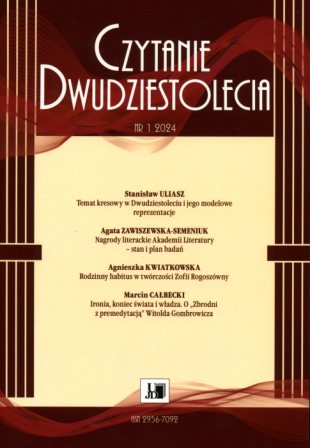Tuwim and the alternative. About contemporary musical adaptations of Skamandrite’s poetry
Keywords:
avant-garde, counterculture, alternative, Julian TuwimAbstract
The article deals with the presence and popularity of poetry in the popular circuit and especially in the alternative music scene. Since 1970, when Czesław Niemen and Marek Grechuta presented a new way of interpreting the poetry of the great classics of literature, there has not been as much interest in poetry in the music circulation as there has been on the Polish scene since 2000. Par-ticularly the poetry of the 1920s (Tuwim, Broniewski, Gałczyński) has become a source of musical inspiration. One of the reasons for this popularity seems to be the common anti-system message, combining avant-garde and counterculture. Using the example of musical adaptations of Julian Tuwim’s poetry, the article tries to point out the common ground between avant-garde poetry and alternative aesthetics. These links can be seen in the strong politicisation of the message, social involvement, but also in the sensitivity to the word, the turn to the everyday and the lan-guage of the street.
References
Bibliografia:
Buczkówna M., Niemen w dolinie świec, „Literatura” 1975, nr 6, s. 5.
Cegielski M., Leksykon buntowników, Agora, Warszawa 2013.
Florczyk T., Symboliczny gest cmoknięcia w satyrze Juliana Tuwima. Próba analizy języka i określenia deklaracji społecznej w „Wierszu, w którym autor grzecznie, ale stanowczo uprasza liczne zastępy bliźnich, aby go w dupę pocałowali”, „Irydion”2018, t. 4, nr 2, s. 35–45.
GajdaK., Szarpidruty i poeci. Piosenka wobec przemian społecznych i kulturowych ostatnich dekad, Wydawnictwo Naukowe UAM, Poznań 2017.
Hejmej A., Muzyczność dzieła literackiego, Wydawnictwo Uniwersytetu Wrocławskiego, Wrocław 2001.
Ignaczak L., Tuwimowski romans z piosenką, [w:] Julian Tuwim. Biografia. Twórczość. Recepcja, red. K. Ratajska, T. Cieślak, Wydawnictwo Uniwersytetu Łódzkiego, Łódź 2007, s. 252–268.
Królikowski W., 22 Polish Punk Classics, 1993, tekst we wkładce płyty. List Juliana Tuwima, „Robotnik” 1929, nr 316, s. 2.
Platonow R.S., Korzenie poezji gitarowej, przeł. K. Wiszniewska-Mazgiel, „Tekstualia” 2018, t.2, nr 53, s. 147–156.
Roszak T., The Making of a Counter Culture: Reflections on the Technocratic Society and Its Youthful Opposition, Doubleday 1969.
Sobczak P., Tekst piosenki jako dzieło literackie – dzieło literackie jako tekst piosenki. Zarys problematyki, przykłady realizacji, „Folia Litteraria Polonica” 2012, t. 16, nr 2, s. 127–139.
Stasiuk A., Jak nie zostałem pisarzem (próba autobiografii intelektualnej), Wydawnictwo Czarne, Wołowiec 1998.
Stępień T., Kabaret Juliana Tuwima, Śląsk, Katowice 1989.
Traczyk M., Poezja w piosence. Od Tuwima do Świetlickiego, Wydawnictwo Poznańskie, Poznań 2009.
Tuwim J., O piosence, „Przekrój”1947, nr 91, s. 14.
Tuwim J., Pogawędka o polskiej piosence kabaretowej, [w:] Dzieła, t. 5: Pisma prozą, oprac. J. Stradecki, Czytelnik, Warszawa 1964.
Urbanek M., Wylękniony bluźnierca, Estymator, Warszawa 2013.
Walc J., Buddenbrokowie i hippisi, [w:] Sporne sprawy polskiej literatury współczesnej, red. A. Brodzka, L. Burska, Instytut Badań Literackich PAN, Warszawa 1998, s. 31–43.
Węgrzyniakowa A., Dialektyka językowej organizacji tekstu w poezji Tuwima, Wydawnictwo Uniwersytetu Śląskiego, Katowice 1987.
Zamiast oficerek nosiłem glany, z K. Vargą rozmawia A. Franaszek, „Tygodnik Powszechny” 2003, nr 6, s. 5.
Netografia
http://olis.onyx.pl/listy/index.asp?lang= [dostęp: 25.02.2023].
https://www.facebook.com/Hanba1926/info/?tab=page_info[dostęp: 2.03.2023].
Kurek M., Sanah debiutuje jako „Królowa dram”. Indie pop i sarkastyczny głos młodego pokolenia. „K-Mag.” https://kmag.pl/article/sanah-debiutuje-jako-krolowa-dram-indie-pop-i-sarkastyczny-glos-mlodego-pokolenia1[dostęp: 26.02.203].
Rafałowska A., Subtelna, zwiewna i świeża. Sanah – nowe oblicze polskiej sceny muzycznej (wywiad), „Fashion Post”, 12 lipca 2019, https://fas-hionpost.pl/subtelna-zwiewna-i-swieza-sanah-nowe-oblicze-polskiej-sceny-muzycznej-wywiad. [dostęp: 15.02.2020].
Rzewuski P., Julian Tuwim wywrotowiec, https://histmag.org/Julian-Tuwim-wy-wrotowiec-7042[dostęp: 2.03.2023].
Dyskografia
Akurat, Prowincja, Agencja Koncertowo-Wydawnicza Akurat, 2003.
Buldog, Chrystus Miasta, wydanie własne, 2010.
Czesław Niemen, Enigmatic, Polskie Nagrania Muza, 1970.
Hańba!, Hańba!, Antena Krzyku, 2016.
Marek Grechuta & Anawa, Polskie Nagrania Muza, 1970.
Piersi i przyjaciele, Izabelin Studio, 1994.
Poeci, Warner Music Poland, 2009.
Sanah, Sanah śpiewa poezyje, Magic Records, Universal Music Polska, 2022.
Śpiewane Dwudziestolecie, CD 2023.
Downloads
Published
Issue
Section
License
Copyright (c) 2025 Adam Regiewicz

This work is licensed under a Creative Commons Attribution 4.0 International License.


